#Colonies of Paradise
Text
Translation Tuesdays: Colonies of Paradise, by Matthias Goritz @nyjb
A series dedicated to literature in translation whether classic or contemporary.
Ranging across the globe and excavating past and present, Colonies of Paradise by Matthias Göritz is a personal journey of self-discovery.
youtube
View On WordPress
#book#book reviews#Colonies of Paradise#german#german language#german literature#langfocus#Mary Jo Bang#Matthias Goritz#poetry#TriQuarterly Books#Youtube
3 notes
·
View notes
Text

263 notes
·
View notes
Text
Black Sails Nation!
No, sadly, no new episode is ready YET, however, I do have a preview clip for you and a sneak peek at the cover art for Episode 10!
I wanted to share a clip from my interview with Dr. Alex Tankard, who will be featured on the next episode of Reading Between the Lines. Dr. Tankard and I had an amazing and lengthy discussion about all things Black Sails, but in particular, as Flint relates to Luciferian lore in literary texts like Paradise Lost. In discussing Flint’s “darkness” they touched on the themes of “otherness”, of darkness, and the demonization of neurodivergence in Colonial Literature, as it relates to Joseph Conrad’s Heart of Darkness.
The cover art is by the endlessly talented @tiofrean who very graciously donated this commission to the podcast! He’s so beautiful! He’s so sad!
*clip is a spoiler-free preview!

#black sails#captain flint#james flint#james mcgraw#captain james flint#reading between the lines podcast#fan art#tora draws#tora tiofrean#Dr. Alex Tankard#Episode 10 is gonna be a BANGER!!#neurodivergence#neurodivergent Flint#Luciferian Lore#Paradise Lost#Heart of Darkness#Darkness and Neurodivergence in Colonial Literature
14 notes
·
View notes
Text
just found out the lead singer of taiwans biggest death metal band is also an active parliament member since like 2015.... and is still active as a death metal singer. he's a pretty standard taiwanese center left anti communist from what i could gather. which like as a leftist i dont really agree with but i also dont know enough abt taiwanese politics to like make a full judgement. though he seems to be a standard liberal nothing remarkable, radical, or new, not overtly horrible but just bland. but that was something i definitely did Not expect. apparently he's very pro indigenous rights and self determination for indigenous people but being in a centre left mega party like the DPP does not seem like the best way to achieve that. But yea, just thought I'd share

#chthinic collabed heavily with collage last year and ik natsuki (lead singer of collage) is very pro indigenous rights and posts abt it a#lot of instagram and i really appreciate the amount of political stuff on her platform. its all very progressive tho v much limited to tw#so idk. i kind of got the cibe of some groups that see taiwanese indigenous issues as seperate to the larger issue of colonialism and#indigenous rights all over the world to conflicts such as palestine. where some other groups have a lot more of the collective consciousnes#and idk. my view is limited and i didnt see that much but when i go back i def wanna look for more political groups in tw and learn about#the political landscape there for leftism. theres a lot of potential in tw imo#chthonic* natsuko**#edit: overall i think that like.. i get the spirit but i feel like for many taiwanese the identity of tw has been everyone united agaisnt#china which i can understand from the perspective of the indigenous ppl that had their land colonized by the japanese then had to share with#the fleeing kmt settlers. but like i dont think that its the best approach to say only china bad rather than big governments threatening to#take your land by force is bad. because idk my take on china and tw is that regardless of the historical claim or wtv. taiwans indigenous#people have been there long before the han ever stepped foot. and china isnt all good as seen in its treatment of the uyghers and tibetans#but is overall not nearly as bad as the west paints it to be. china is neither fully a communist paradise. and has many capitalist undertone#s influence the government ever since deng xiaoping came to power. personally i never fully agreed with mao. i think mao was a necessary#figure in the beginning and let power go to his head and i believe zhou enlai always shouldve been the founder of the PRC#fuck the kmt.. never liked the kmt and it seems as they are also slowly losing favor in tw also. and like... hmm#i need to do more reading tho. none of this is like 100% set in stone how i feel bc theres a lot i dont know
7 notes
·
View notes
Text
France does not deserve to be romanticized. At all.
This was brought to you by a French girl living abroad and constantly puzzled by how much people think France is better than it is. It's not. Believe me.
It's not worse nor better than any other country. It's just a country.
#yes the Enlightenment's ideas were mostly theorized by French men.#no it doesn't mean France embodies them at all. Not now nor ever. Our colonial past is o ly one of the njmerous examples of it.#yes it's better to live in France than in a lot of other country.#no it doesn't mean that it's a paradise to live in or that we can't complain about what's not going well.#it stupefies me how people think France is this absolute heaven of human rights and providence to live#and how other european then think we should stop protesting about anything because we better off than most#(also on the pension reform: no us peotesting is not unfair to other europeans because no you do not pay for us)#(it has nothing to do whatsoever)#french politics#pia's oversharing
13 notes
·
View notes
Text
I watched The Onion’s Sex House. this was only brought to my attention today by a stray reference in a Don’t Hug Me I’m Scared analysis video.
I’m not gonna lie, that frog spin-off sounds like it would unironically be a fun watch. There has to be an animal documentary series that speaks of the animals like a reality tv drama cast, somewhere. We have the puppy and kitten bowl sports shows and livestreams of shrimp, it’s within reach. There are ethical ways to do these things. There could be a zoo with cameras then somebody else voices and edits it to cover the lives of the interpersonal local meercats. We have penguin ship charts, this feels like it would be a next step in the natural progression of animal behavioral content, if done right. We facetimed eels during the pandemic, where is frog sex house???
#the onion sex house#horror stuff#I'm like bob's burger's lynda watching the raccoon colony in the alley#ah to be a scientist observing the interactions of mouse paradise
13 notes
·
View notes
Text
white ppl ruining my mood today

#vic.txt#dhmu genuinely upset over settler colonialism#bathala sa langit namin palayasin nyo ang mga demonyong ito sa lupain namin salamat ph0wzxc#our cost of living keeps rising while these ppl just keep waltzing in to raise them even higher coz they think the place we live is just#an exotic tropical paradise for them to explore and consume. Bye
6 notes
·
View notes
Text
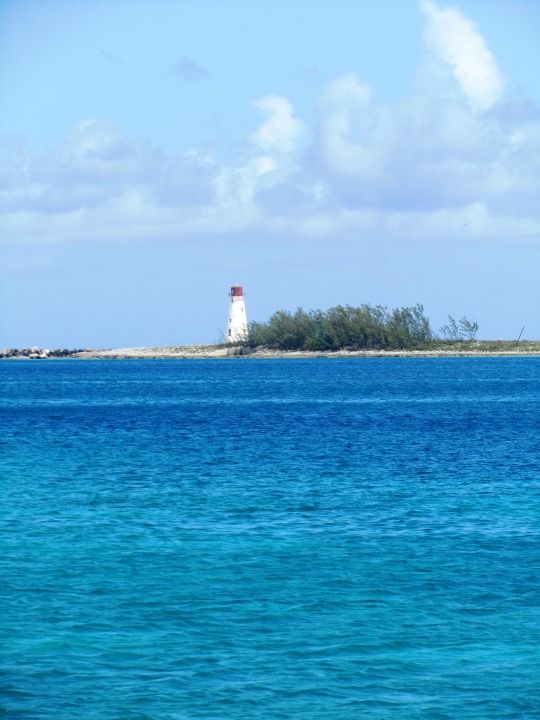

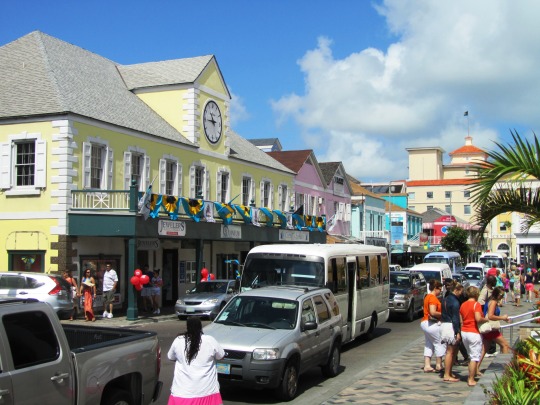
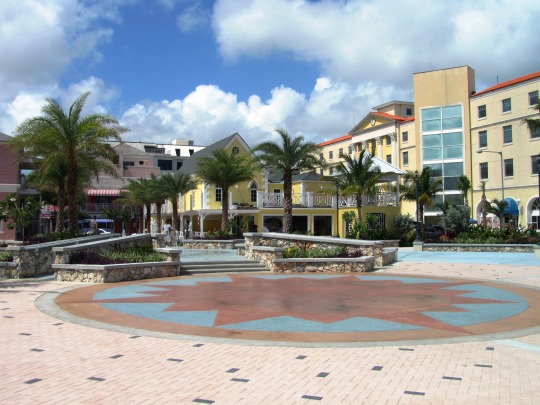

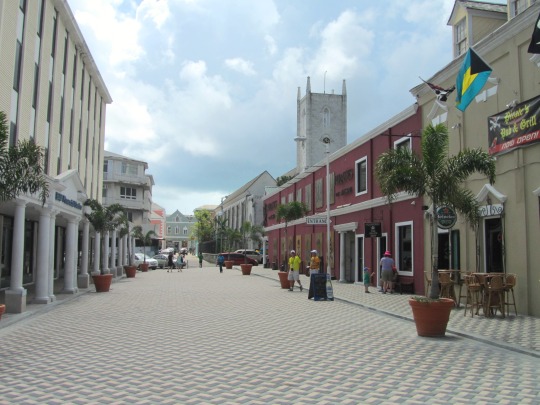




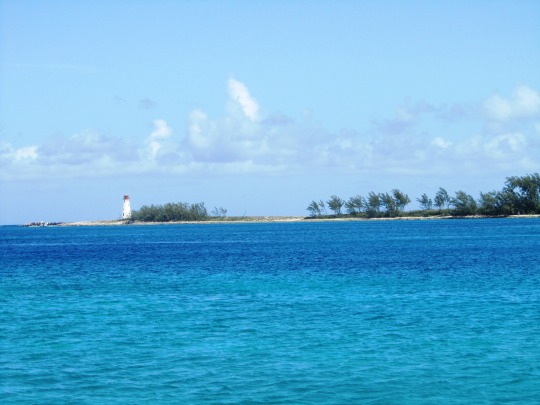



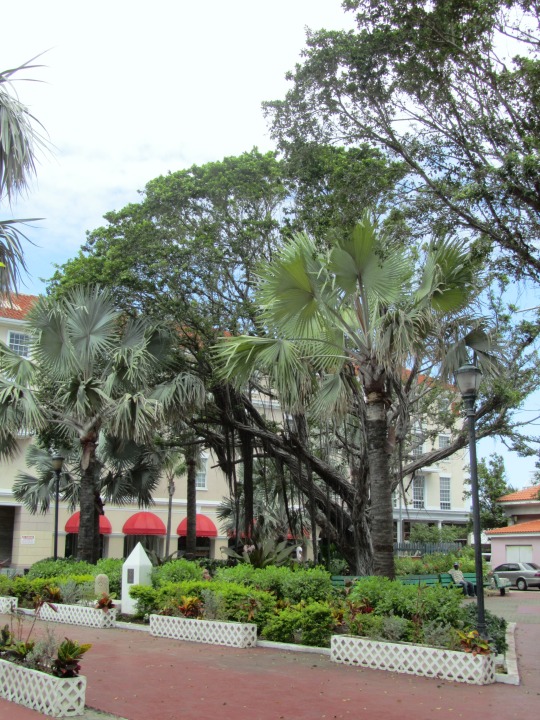
Spanish explorer Juan Ponce de León reached the northern end of The Bahamas on his first voyage to Florida on March 27, 1513.
#Pompey Square#Juan Ponce de León#reached#The Bahamas#27 March 1513#anniversary#white colonialism#summer 2013#travel#architecture#Nassau#original photography#vacation#tourist attraction#cityscape#Bay Street#Straw Market#Paradise Island#ligthouse#Atlantic Ocean#Christ Church Cathedral#Rawson Square#Bahamian Parliament#Bank Lane#history#landmark
1 note
·
View note
Text
Also in my current main oni playthrough I'm at 22 duplicants and my goal for the playthrough is to get all of them so I'm abt halfway there but god damn do I not have enough space for more of these fuckers I'm going to be able to shove some more into my two newest colonies on the two planetoids I've traveled to so far but one of them like Just got started so it's going to be a while before I'm confident in upscaling it, and the other one is mostly made up of radioactive biomes and salt water biomes with the only more livable biomes being at the very edges and the very bottom of the map, so while I do have a pretty stable base getting set up over there it's going to be pretty obnoxious getting the living space set up due to how little space I have in my current main base area and how far away the other forest biomes are from that. On the bright side I found the mysterious hermit home on the brand new planetoid so I at least don't have to worry abt him as much, although I'm gonna be real idk how I'm going to get food production up and running since there's like No dirt, and I don't rly want to have to send someone back up through the surface magma biome to pick up any dropped off supplies.
#rat rambles#the good news is that theres sleet weat on the newest one so once I get a lil more established thats smth I can start farming#theres also grub fruit and sweetles so Ill probably we farming those for a bit too#I say for a bit because while there is a sulfur gyser there its in the magma and I dont wanna fuck with that right now at least#if I was better at this game Id totally go for it but Im not so Ill take the cowards route#hopefully I can print some other seeds into that colony although Im not rly sure which plants Id want#I guess bristle blossoms wouldnt be bad? most of the planet is quite warm tho so idk#its mostly wasteland and chilly biomes Im pretty sure so not the best but could be worse#the main big big issue is going to be oxygen production and water#for now Im probably going to start moving ice to a warmer part of the map to melt it but after that idk#I guess I could just get the hermit and then bounce#honestly thats probably what Ill do since I really dont want to have to deal with the limited water#all my other colonies have infinite water sources already so I might as well focus living quarters there#my first colony is gonna stay limited tho since its the rly cold starting planetoid#Ive gotten my main base warm enough but I dont rly want to expand too much from there#mostly because the left of it is my sleet wheat farm and the right is where my cold slush guyser is#which I rly Should warm up more but Im going to be real I dont want to go too heavy on the forced warming#I want to leave myself with room to build more machinery without burning my base up basically#my other main planetoid is basically paradise for the dupes living there tho theyre doing great my chef even gets his own personal bedroom#I have a great farm set up and have way way more food than even ten more dupes could ever eat#I have been considering bringing in more dupes there but I wanna up my oxygen production more first#I finally ran out of algae and while I could theoretically produce more Ive slowly transferring to the water eating oxygen producer instead#I say slowly cause the process of getting the steam guiser on that plannet to be a decent water supply has been rough#its still not done since Im trying to get a steam turbine cooling loop set up on the other planet to utalize both the water and steam#but its been real hard given the lack of usable space in that colonu#my main problem is that I cant get the temperature to stay at a consistent level due to using heavy wiring#which is really frustrating since these things have so much power flowing through them I absolutely cannot afford to use normal wiring#like I could try to implement power tranformers into the design but Id really rather not since thatd mean taking up even more space#I might just get a insulated heavy wire connector mod or smth I rly cant be bothered after putting this much time into this project#oni posting
0 notes
Photo

Phoenix Gable Roofing
Inspiration for a huge southwestern beige two-story stucco exterior home remodel with a tile roof
0 notes
Text


every day is crueler than the last and the nightmare continues another day. another life was the cost of flour.
fuck israel. fuck biden and his administration. fuck the untied states. may any individual who supports this endless cycle of murder suffer what they have inflicted on innumerable innocent.
may the martyred rest in paradise. glory to the resistance. the apartheid entity will fall before our very eyes, with its fellow colonial regimes.
#palestine#gaza#from the river to the sea palestine will be free#is there anything else even left to say
5K notes
·
View notes
Text
okay. so.
i'm reading this book The Origins of the Modern World by Robert Marks
and even from the beginning i was getting this weird feeling from it. I'm always really wary of books that are broad overviews of history that claim to explore big theory-of-everything explanations for very broad phenomena, because history is unbelievably complex and there is so much disagreement between historians about everything.
But anyway I come to this section (in the first chapter)
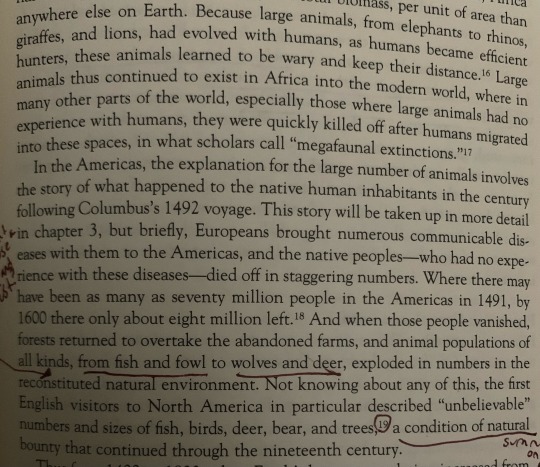
This writer's opinion is that the Americas seemed so abundant when English settlers first arrived because the Native Americans had been mostly killed, and as a result, the wildlife increased greatly in numbers and forests overtook the farms, creating what appeared to be a natural paradise.
I'm immediately suspicious of this paragraph because arguing that the mass death of Native Americans was good for nature seems really contradictory to the research I've explored, on top of being just...disgusting.
But it doesn't sound right in regards to how ecosystems work either. If populations of animals had recently exploded after millennia of being limited by a major predator, it would cause the plants to be overwhelmed by the herbivore populations. The land would be stripped barren and eroded, and soon the animals would be weak and starving.
So I thought to myself, huh, a citation. I will look at the citation and see what it says.
It's a book called Changes in the Land by William Cronon, who seems to be one of the most important and respected guys in his field. I thought, I have to find this book. So I did, I found the book, and spent like an hour reading through it.
And what I discovered, is that Cronon's book directly contradicts what Marks says in the paragraph that cites Cronon?!

So basically this entire book, Changes in the Land, is a detailed exploration of how the arrival of English settlers, the decline of Native American populations, and the slow transition to European farming and land use practices caused increasing degradation to the ecosystem, beginning very early on in colonization.
Changes in the Land quotes a great array of documents from the colonial period where settlers observed the soil becoming depleted, animals disappearing, and the climate itself becoming more hostile even in the 1600's. It's actually a really fascinating book.
Cronon tells us that Native Americans created lush and abundant conditions for wild animals by causing a "mosaic" of habitats, with different areas representing various stages of ecological succession. With this great diversity in habitats, and lots of transitional "edges" between them, the prosperity of the animal life was maximized. This was intentional, and really a type of farming.
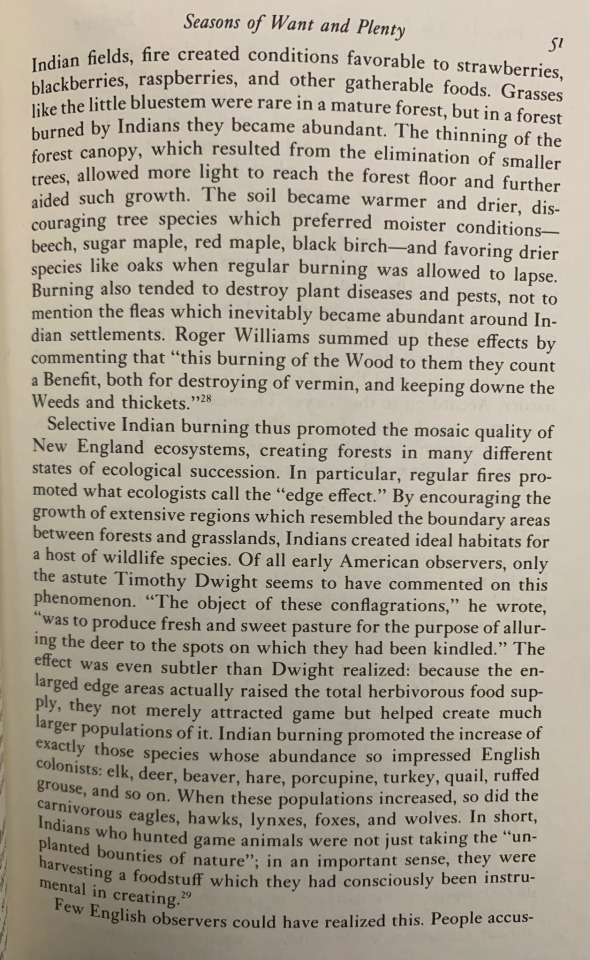
The book essentially explains how European settlers couldn't recognize Native American life ways as "agriculture," they thought the land was just supernaturally abundant all by itself because of its inherent nature, and yet almost immediately after settlers came, the abundance of the land degraded and vanished. The settlers cut down vast amounts of trees, which caused erosion, which destroyed the river and stream ecosystems and starved the soil of nutrients. Destruction of forest caused less rain, and more extreme temperatures. It became a vicious cycle where the settlers had to abuse the land more and more just to survive.
The spiral pulled in Native American communities too, forcing them to turn to more exploitative means of survival like the fur trade, (which depleted the beaver population, which caused the decline of beaver ponds, which harmed the whole forest). It describes how the changing ecosystems left Native Americans with no choice but to turn to European practices for survival, which in turn depleted the land even further.
Even I was surprised to learn just how early on environmental disaster set in, and the incredible extent of it. English farming practices literally reshaped the map of New Haven between the 17th and 18th centuries:
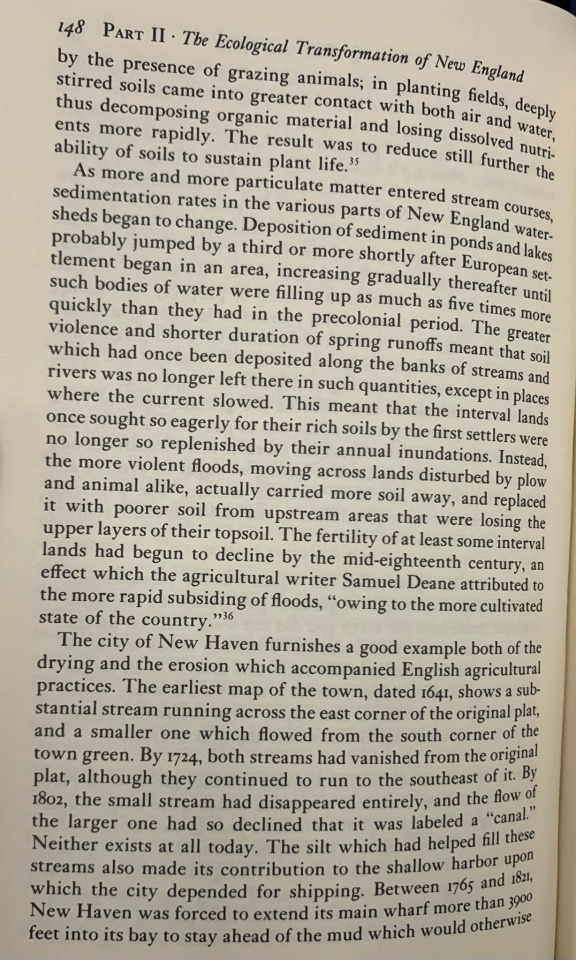
To return to Marks, though...Marks' statement in the excerpt, where he says the "abundance" of animals continued throughout the 19th century, is blatantly false according to the source HE CITES.
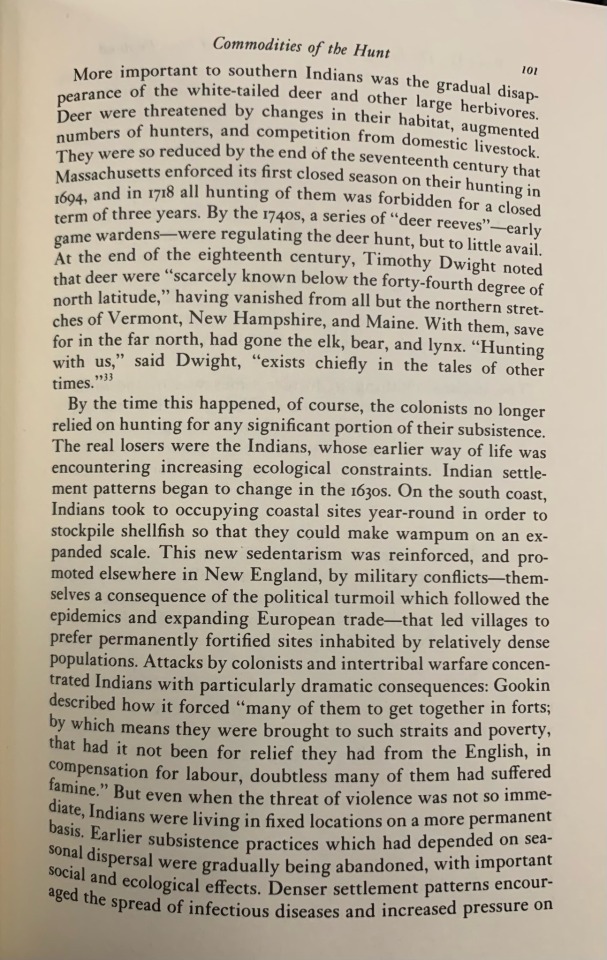
Deer were becoming scarce in New England by the 1690's. It was so bad by 1718 that deer hunting was forbidden for 3 years at that time, and by 1800, deer were almost extirpated from New England. The book explains on another page that wild turkeys became so rare that a farmer's manual from the time said their domesticated turkeys were from Turkey—settlers had no opportunity to see a wild turkey and no idea they existed.
Marks is supporting his statement using a source entirely dedicated to contradicting the exact thing he's saying! It's unbelievable.
How does this happen? Did Marks just have his own opinion and insert a famous book that seemed to be on the subject as support, without reading it?
I'm thinking now of all the times I've read a book and seen a citation on a statement and unconsciously thought "oh, well it seems there is evidence, so it must be reliable" when actually, something like this was happening. The array of ways misinformation can be propagated and never be found out is terrifying.
2K notes
·
View notes
Text
One aspect of the story of Dune that the movies don't make super clear is that, before Paul, the Fremen already had a central leader figure in Liet Kynes. In the book, Kynes has a generations-long plan to gather enough water to transform the environment of Dune (this is why the Fremen have those big pools, they never get super clear about that), then retake the planet for the Fremen and create paradise. Paul showing up and then leaning into the whole Lisan al-Gaib bit pretty much directly gets Kynes killed, creating a power vacuum into which he assumes himself with the aid of his previously-unheard-of levels of white privilege. While Kynes was an ecologist, however, Paul comes from a family of colonial military aristocrats. All Paul can offer the Fremen is all he understands: revenge. Bloody revenge for everything they've endured in centuries of oppression by the Imperium, temporarily in line with the revenge he craves for the Imperium's attempts to control him and his family, and spiritually in line with the resentment built up all across this socially stagnant feudal space empire.
2K notes
·
View notes
Text






The Ivy Estate, built by FarfallaSims ♡
Located in the coziest nook of Brindleton Bay is The Ivy Estate, a beautiful home for your favorite equestrian to settle down. With stables that can fit two adult horses, this is an equestrian's paradise, and even comes with a pool that is perfect to take a dip in after riding all day long.
This property has 3 bedrooms and 3 bathrooms as well as large patio space that is perfect for entertaining. For only 213,539 Simoleons, this property can be yours to make your own memories.
All Information & Link Under Cut
Gallery ID | FarfallaSims
$213,539.00
3 Bedroom 3 Bathroom
Pool & Stables
Lot Size 40x40 in Brindleton Bay
Move-In Ready
Used BB.MoveObjects On & TOOL
Packs in the Build | Horse Ranch, Cottage Living, Snowy Escape, Discover University, Island Living, Cats & Dogs, Get Together & Romantic Garden Stuff
CC Used
Harrie | Coastal (1)(2)(3)(4) Octave (1)
Felixandre | Florence (1)(2) Chateau (1)(2) Colonial (1) SoHo (1) Grove (1)
House of Harlix | Baysic (1) Orjanic (1)
Max20 | Garden at Home (1) Cozy Backyard (1)
Pierisim | MCM (1) Woodland Ranch (1)
Syboubou | Fencing (1) Pool Trim (1)
MrOlkan | Pool Swatch (1)
LorySims | Jeep (1)
Ravasheen | Lighting (1)IEQ Sims | Stable Doors & Windows (1)(2)
Alf-Si | Trees (1) Hydrangeas (1)
Other Notes
GShade Preset | Pearl by PixelGlam
Lighting Mod | Sunblind by Softerhaze
Enable BB.MoveObjects Before Placing.
Please do NOT reupload my build furnished or unfurnished.
Floorplan shown on Patreon.
Kindly, please let me know if there are any missing mods or issues with the build!
Link to Build | The Ivy Estate
Massive thank you to the CC Creators! @harrie-cc @pierisim @felixandresims @mrolkanyt @syboubou @lorysims
#farfallasims#mydownloads#sims 4 build#sims build#the sims 4 build#showusyourbuilds#ts4 build#sims 4 download#the sims#the sims 4#sims 4#sims#sims 4 screenshots#the sims community#sims 4 maxis match#ts4 simblr#thesims4#sims4#the sims4#sims 4 simblr#simblr
1K notes
·
View notes
Text
Kelly and Zach Weinersmith’s “A City On Mars”
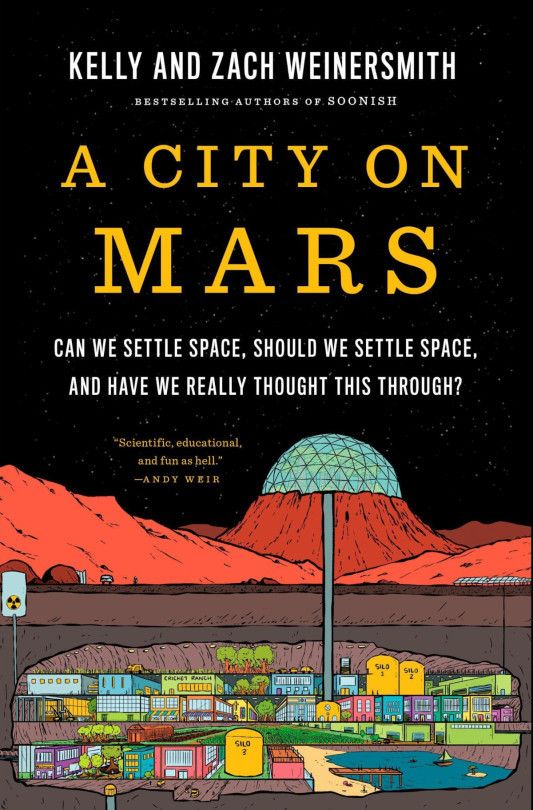
In A City On Mars, biologist Kelly Weinersmith and cartoonist Zach Weinersmith set out to investigate the governance challenges of the impending space settlements they were told were just over the horizon. Instead, they discovered that humans aren't going to be settling space for a very long time, and so they wrote a book about that instead:
https://www.acityonmars.com/
The Weinersmiths make the (convincing) case that ever aspect of space settlement is vastly beyond our current or reasonably foreseeable technical capability. What's more, every argument in favor of pursuing space settlement is errant nonsense. And finally: all the energy we are putting into space settlement actually holds back real space science, which offers numerous benefits to our species and planet (and is just darned cool).
Every place we might settle in space – giant rotating rings, the Moon, Mars – is vastly more hostile than Earth. Not just more hostile than Earth as it stands today – the most degraded, climate-wracked, nuke-blasted Earth you can imagine is a paradise of habitability compared to anything else. Mars is covered in poison and the sky disappears under planet-sized storms that go on and on. The Moon is covered in black-lung-causing, razor-sharp, electrostatically charged dust. Everything is radioactive. There's virtually no water. There are temperature swings of hundreds of degrees every couple of hours or weeks. You're completely out of range of resupply, emergency help, or, you know, air.
There's Helium 3 on the Moon, but not much of it, and there is no universe in which is it cheaper to mine for Helium 3 on the Moon than it is to mine for it on Earth. That's generally true of anything we might bring back from space, up to and including continent-sized chunks of asteroid platinum.
Going to space doesn't end war. The countries that have gone to space are among the most militarily belligerent in human history. The people who've been to space have come back perfectly prepared to wage war.
Going to space won't save us from the climate emergency. The unimaginably vast trove of material and the energy and advanced technology needed to lift it off Earth and get it to Mars is orders of magnitude more material and energy than we would need to resolve the actual climate emergency here.
We aren't anywhere near being a "multiplanetary species." The number of humans you need in a colony to establish a new population is hard to estimate, but it's very large. Larger than we can foreseeably establish on the Moon, on Mars, or on a space-station. But even if we could establish such a colony, there's little evidence that it could sustain itself – not only are we a very, very long way off from such a population being able to satisfy its material needs off-planet, but we have little reason to believe that children could gestate, be born, and grow to adulthood off-planet.
To top it all off, there's space law – the inciting subject matter for this excellent book. There's a lot of space law, and while there are some areas of ambiguity, the claims of would-be space entrepreneurs about how their plans are permissible under the settled parts of space law don't hold up. But those claims are robust compared to claims that space law will simply sublimate into its constituent molecules when exposed to the reality of space travel, space settlement, and (most importantly) space extraction.
Space law doesn't exist in a vacuum (rimshot). It is parallel to – and shares history with – laws regarding Antarctica, the ocean's surface, and the ocean's floor. These laws relate to territories that are both vastly easier to access and far more densely populated by valuable natural resources. The fact that they remain operative in the face of economic imperatives demands that space settlement advocates offer a more convincing account than "money talks, bullshit walks, space law is toast the minute we land on a $14 quadrillion platinum asteroid."
The Weinersmiths have such an account in defense of space law: namely, that space law, and its terrestrial analogs, constitute a durable means of resolving conflicts that would otherwise give rise to outcomes that are far worse for science, entrepreneurship, human thriving or nation-building than the impediments these laws represent.
What's more, space law is enforceable. Not only would any space settlement be terribly, urgently dependent on support from Earth for the long-foreseeable future, but every asteroid miner, Lunar He3 exporter and Martian potato-farmer hoping to monetize their products would have an enforcement nexus with a terrestrial nation and thus the courts of that nation.
But the Weinersmiths aren't anti-space. They aren't even anti-space-settlement. Rather, they argue that the path to space-based scientific breakthroughs, exploration of our solar system, and a deeper understanding of our moral standing in a vast universe cannot start with space settlements.
Landing people on the Moon or Mars any time soon is a stunt – a very, very expensive stunt. These boondoggles aren't just terribly risky (though they are – people who attempt space settlement are very likely to die horribly and after not very long), they come with price-tags that would pay for meaningful space science. For the price of a crewed return trip to Mars, you could put multiple robots onto every significant object in our solar system, and pilot an appreciable fleet of these robot explorers back to Earth with samples.
For the cost of a tiny, fraught, lethal Moon-base, we could create hundreds of experiments in creating efficient, long-term, closed biospheres for human life.
That's the crux of the Weinersmiths' argument: if you want to establish space settlements, you need to do a bunch of other stuff first, like figure out life-support, learn more about our celestial neighbors, and vastly improve our robotics. If you want to create stable space-settlements, you'll need to create robust governance systems – space law that you can count on, rather than space law that you plan on shoving out the airlock. If you want humans to reproduce in space – a necessary precondition for a space settlement that lasts more than a single human lifespan – then we need to do things like breed multiple generations of rodents and other animals, on space stations.
Space is amazing. Space science is amazing. Crewed scientific space missions are amazing. But space isn't amazing because it offers a "Plan B" for an Earth that is imperiled by humanity's recklessness. Space isn't amazing because it offers unparalleled material wealth, or unlimited energy, or a chance to live without laws or governance. It's not amazing because it will end war by mixing the sensawunda of the "Pale Blue Dot" with the lebensraum of an infinite universe.
A science-driven approach to space offers many dividends for our species and planet. If we can figure out how to extract resources as dispersed as Lunar He3 or asteroid ice, we'll have solved problems like extracting tons of gold from the ocean or conflict minerals from landfill sites, these being several orders of magnitude more resource-dense than space. If we can figure out how to create self-sustaining terraria for large human populations in the radiation-, heat- and cold-blasted environs of space, we will have learned vital things about our own planet's ecosystems. If we can build the robots that are necessary for supporting a space society, we will have learned how to build robots that take up the most dangerous and unpleasant tasks that human workers perform on Earth today.
In other words, it's not just that we should solve Earth's problems before attempting space settlement – it's that we can't settle space until we figure out the solutions to Earth's problems. Earth's problems are far simpler than the problems of space settlement.
As I read the Weinersmiths' critique of space settlement, I kept thinking of the pointless AI debates I keep getting dragged into. Arguments for space settlement that turn on existential risks (like humanity being wiped out by comets, sunspots, nuclear armageddon or climate collapse) sound an awful lot like the arguments about "AI safety" – the "risk" that the plausible sentence generator is on the verge of becoming conscious and turning us all into paperclips.
Both arguments are part of a sales-pitch for investment in commercial ventures that have no plausible commercial case, but whose backers are hoping to get rich anyway, and are (often) sincerely besotted with their own fantasies:
https://locusmag.com/2023/12/commentary-cory-doctorow-what-kind-of-bubble-is-ai/
Both AI and space settlement pass over the real risks, such as the climate consequences of their deployment, or the labor conditions associated with their production. After all, when you're heading off existential risk, you don't stop to worry about some carbon emissions or wage theft.
And critically, both ignore the useful (but resolutely noncommercial) ways that AI or space science can benefit our species. AI radiology analysis might be useful as an adjunct to human radiological analysis, but that is more expensive, not less. Space science might help us learn to use our materials more efficiently on Earth, and that will come long before anyone makes rendezvous with a $14 quadrillion platinum asteroid.
There are beneficial uses for LLMs. When the Human Rights Data Analysis Group uses an LLM to help the Innocence Project New Orleans extract and categorize officer information from wrongful conviction records, they are doing something valuable and important:
https://hrdag.org/tech-notes/large-language-models-IPNO.html
It's socially important work, a form of automation that is an unalloyed good, but you won't hear about it from LLM advocates. No one is gonna get rich on improving the efficiency of overturning wrongful convictions with natural language processing. You can't inflate a stock bubble with the Innocence Project.
By the same token, learning about improving gestational health by breeding multigenerational mouse families in geosynchronous orbit is no way to get a billionaire tech baron to commit $250 billion to space science. But that's not an argument against emphasizing real science that really benefits our whole species. It's an argument for taking away capital allocation authority from tech billionaires.
I'm a science fiction writer. I love stories about space. But I can distinguish fantasy from reality and thought experiments from suggestions. Kim Stanley Robinson's 2015 novel Aurora – about failed space settlement – is every bit as fascinating and inspirational as "golden age" sf:
https://memex.craphound.com/2015/11/02/kim-stanley-robinsons-aurora-space-is-bigger-than-you-think/
But still, it inspired howls of outrage from would-be space colonists. So much so that Stan wrote a brilliant essay explaining what we were all missing about space settlement, which I published:
https://boingboing.net/2015/11/16/our-generation-ships-will-sink.html
With City on Mars, the Weinersmiths aren't making the case for giving up on space, nor are they trying to strip space of its romance and excitement. They're trying to get us to focus on the beneficial, exciting, serious space science we can do right now, not just because it's attainable and useful – but because it is a necessary precondition for any actual space settlement in the distant future.

If you'd like an essay-formatted version of this post to read or share, here's a link to it on pluralistic.net, my surveillance-free, ad-free, tracker-free blog:
https://pluralistic.net/2024/01/09/astrobezzle/#send-robots-instead
#pluralistic#books#reviews#space#bezzles#mars#spacex#robots#science#space science#space travel#space settlement#space colonization
1K notes
·
View notes
Text
Once upon a time there was an Entity, that saw humans for the first time and decided to want one of its own. Gathering together tools, fruit trees, running water, songbirds, sunshine and shade, the Entity created a little container that had everything a human could possibly want and need, and then gently picked one up, and placed her in the enclosure.
"There", the Entity said, "you are mine now, and I have put you here where you have everything you want, because I love you so much. Are you happy?"
"No", the human said, "for I miss my mother and father, and I miss my sister and her children, and I cannot be happy without them." The Entity listened and left, heading back to where it took the human in order to find her kin.
"There", the Entity said, "I have brought your family together, so you are no longer apart. Are you happy now?"
"No", the human said, "for my sister's children miss their father, and my sister misses her too, and none of us can be happy if they are unhappy." The Entity listened and left, heading back to where it toook the humans in order to find the one it neglected to take.
"There", the Entity said as it put down the one last missing human, whose children ran to meet him, crying and laughing from relief. The Entity addressed them all. "Now you have all your family. Are you happy now?"
"No", the humans said, "for my mother misses the neighbours she gossips with, my father misses the friends with whom he played cards, the children miss their playmates, and..." This time the Entity did not even listen to the end, but left back to the place where it had found the humans, and gently scooped up every single human in the city, bringing them to their new beautiful little enclosure.
"There", the Entity said, addressing the whole colony it had gathered into this beautiful paradise that it had made especially for them. "I have now brought all of you together, so none of you are apart. Are you happy now?"
"No", the humans said, "for we miss our beautiful homes, we miss our familiar streets. We miss the fountains and statues and the calls of city birds, and we cannot be happy if we can never go back home again."
So the Entity left, went back to the city that was now empty, carefully picked up the whole thing, and moved it to the enclosure, careful to not alter a single detail, and put everything as it should be. "There", it then said to the humans, "now your homes are here, too. Are you happy now?"
"No", the humans said, "for-"
The Entity sighed in frustration, and began unbraiding the weaves of time, undoing the past several days so that none of this had ever happened, as a creature that wants and yearns so much is simply too much trouble to own.
999 notes
·
View notes